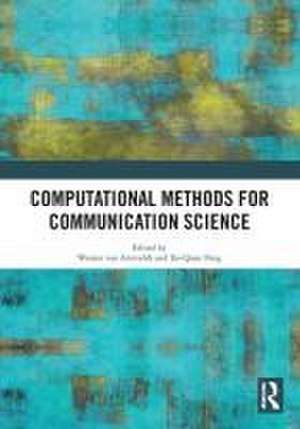Computational Methods for Communication Science
Editat de Wouter van Atteveldt, Tai-Quan Pengen Limba Engleză Paperback – 25 sep 2023
This book discusses the validity of using big data in communication science and showcases a number of new methods and applications in the fields of text and network analysis. Computational methods have the potential to greatly enhance the scientific study of communication because they allow us to move towards collaborative large-N studies of actual behavior in its social context. This requires us to develop new skills and infrastructure and meet the challenges of open, valid, reliable, and ethical "big data" research. This volume brings together a number of leading scholars in this emerging field, contributing to the increasing development and adaptation of computational methods in communication science.
The chapters in this book were originally published as a special issue of the journal Communication Methods and Measures.
| Toate formatele și edițiile | Preț | Express |
|---|---|---|
| Paperback (1) | 328.79 lei 6-8 săpt. | |
| Taylor & Francis – 25 sep 2023 | 328.79 lei 6-8 săpt. | |
| Hardback (1) | 755.37 lei 6-8 săpt. | |
| Taylor & Francis – 30 mar 2021 | 755.37 lei 6-8 săpt. |
Preț: 328.79 lei
Preț vechi: 410.98 lei
-20% Nou
Puncte Express: 493
Preț estimativ în valută:
62.91€ • 64.91$ • 52.50£
62.91€ • 64.91$ • 52.50£
Carte tipărită la comandă
Livrare economică 27 martie-10 aprilie
Preluare comenzi: 021 569.72.76
Specificații
ISBN-13: 9780367536176
ISBN-10: 036753617X
Pagini: 174
Dimensiuni: 178 x 254 x 10 mm
Greutate: 0.32 kg
Ediția:1
Editura: Taylor & Francis
Colecția Routledge
Locul publicării:Oxford, United Kingdom
ISBN-10: 036753617X
Pagini: 174
Dimensiuni: 178 x 254 x 10 mm
Greutate: 0.32 kg
Ediția:1
Editura: Taylor & Francis
Colecția Routledge
Locul publicării:Oxford, United Kingdom
Public țintă
Postgraduate and UndergraduateCuprins
Introduction: When Communication Meets Computation: Opportunities, Challenges, and Pitfalls in Computational Communication Science
Wouter van Atteveldt and Tai-Quan Peng
1. Applying LDA Topic Modeling in Communication Research: Toward a Valid and Reliable Methodology
Daniel Maier, A. Waldherr, P. Miltner, G. Wiedemann, A. Niekler, A. Keinert, B. Pfetsch, G. Heyer, U. Reber, T. Häussler, H. Schmid-Petri and S. Adam
2. Extracting Latent Moral Information from Text Narratives: Relevance, Challenges, and Solutions
René Weber, J. Michael Mangus, Richard Huskey, Frederic R. Hopp, Ori Amir, Reid Swanson, Andrew Gordon, Peter Khooshabeh, Lindsay Hahn and Ron Tamborini
3. More than Bags of Words: Sentiment Analysis with Word Embeddings
Elena Rudkowsky, Martin Haselmayer, Matthias Wastian, Marcelo Jenny, Štefan Emrich and Michael Sedlmair
4. Scaling up Content Analysis
Damian Trilling and Jeroen G. F. Jonkman
5. How Team Interlock Ecosystems Shape the Assembly of Scientific Teams: A Hypergraph Approach
Alina Lungeanu, Dorothy R. Carter, Leslie A. DeChurch and Noshir S. Contractor
6. Methods and Approaches to Using Web Archives in Computational Communication Research
Matthew S. Weber
7. Disentangling User Samples: A Supervised Machine Learning Approach to Proxy-population Mismatch in Twitter Research
K. Hazel Kwon, J. Hunter Priniski and Monica Chadha
Wouter van Atteveldt and Tai-Quan Peng
1. Applying LDA Topic Modeling in Communication Research: Toward a Valid and Reliable Methodology
Daniel Maier, A. Waldherr, P. Miltner, G. Wiedemann, A. Niekler, A. Keinert, B. Pfetsch, G. Heyer, U. Reber, T. Häussler, H. Schmid-Petri and S. Adam
2. Extracting Latent Moral Information from Text Narratives: Relevance, Challenges, and Solutions
René Weber, J. Michael Mangus, Richard Huskey, Frederic R. Hopp, Ori Amir, Reid Swanson, Andrew Gordon, Peter Khooshabeh, Lindsay Hahn and Ron Tamborini
3. More than Bags of Words: Sentiment Analysis with Word Embeddings
Elena Rudkowsky, Martin Haselmayer, Matthias Wastian, Marcelo Jenny, Štefan Emrich and Michael Sedlmair
4. Scaling up Content Analysis
Damian Trilling and Jeroen G. F. Jonkman
5. How Team Interlock Ecosystems Shape the Assembly of Scientific Teams: A Hypergraph Approach
Alina Lungeanu, Dorothy R. Carter, Leslie A. DeChurch and Noshir S. Contractor
6. Methods and Approaches to Using Web Archives in Computational Communication Research
Matthew S. Weber
7. Disentangling User Samples: A Supervised Machine Learning Approach to Proxy-population Mismatch in Twitter Research
K. Hazel Kwon, J. Hunter Priniski and Monica Chadha
Notă biografică
Wouter van Atteveldt is Associate Professor of Political Communication at VU Amsterdam, the Netherlands. His research interests include computational communication science and the role of news and journalism in the functioning of democracy. He co-founded the ICA division on Computational Methods and is Editor-in-Chief of the journal Computational Communication Research.
Tai-Quan Peng is Associate Professor at the Department of Communication, Michigan State University, East Lansing, USA. His research interest lies in the application of computational methods to examine structure and dynamics of human communication phenomena on social and mobile media. He was the Inaugural Chair of the Computational Methods division at the International Communication Association.
Tai-Quan Peng is Associate Professor at the Department of Communication, Michigan State University, East Lansing, USA. His research interest lies in the application of computational methods to examine structure and dynamics of human communication phenomena on social and mobile media. He was the Inaugural Chair of the Computational Methods division at the International Communication Association.
Descriere
Computational Methods for Communication Science showcases the use of innovative computational methods in the study of communication.
